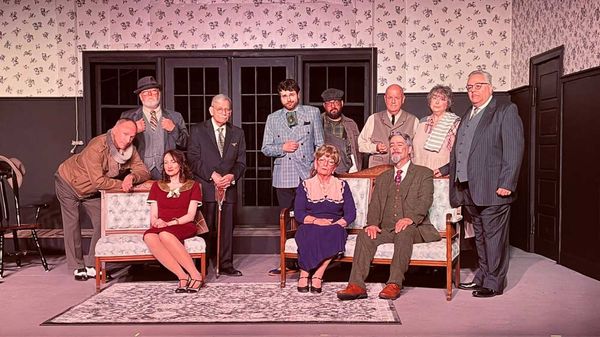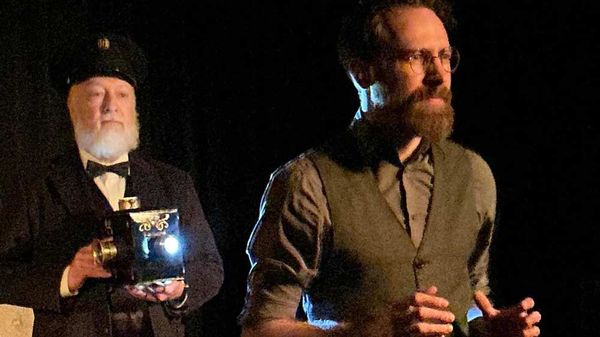December 9, 2011
Tinker Tailor Soldier Spy
Joseph Pisano READ TIME: 5 MIN.
In our popular, cinema-created imaginations, nothing beats the life of a secret agent, which, in between shaken-not-stirred martinis, consists of world-saving exotic adventures, fabulous cars, high-tech gadgets, nice clothes, bloodless killing that never makes you feel all that bad, and, of course, insouciant lovemaking. The only prerequisites for the job appear to be rugged masculinity and at least a tacit commitment to Western imperialism. Unfortunately for Soviet spooks, their Kremlin superiors apparently thought a strict adherence to Marxism-Leninism was its own reward.
As reflected in his James Bond novels, if not the films based on them, Ian Fleming -- the erstwhile World War II intelligence officer -- understood that the clandestine arts are not typically practiced by suave lady-killers with sex appeal to spare. John le Carr�, Fleming's successor as the master of the spy novel, was well aware of this fact, too, having learned about his subject from the very heart of it. Sharing a r�sum� point with the fictional Bond, the merely pseudonymous le Carr� once worked for the British Secret Intelligence Service, more widely known as M16, doing what he could for Her Majesty to bring down the Soviet Union and its puppet governments.
Despite being generally superior to the Bond films, the cinematic adaptations of le Carr�'s espionage thrillers have not had nearly the same cultural impact, probably because, like their source material, they tend to trade in moral complexity rather than male fantasy. The latest, "Tinker Tailor Soldier Spy," adds to this reputation for intelligence, offering a shocking peak behind the cloak-and-dagger curtain, where the shocks come not from exposing titillating truths about spycraft but, rather, existential ones.
Grimly faithful to the cynical spirit, if not each and every detail, of le Carr�'s 1974 novel, Swedish director Tomas Alfredson ("Let the Right One In") depicts an M16 reminiscent of the Chicago real estate office in "Glengarry Glen Ross," a depressing, damnable workplace where unhappy men make a dishonest living from guile and human fallibility. Nicknamed the "Circus" for its Cambridge headquarters, le Carr�'s M16 still has a cadre of older staffers who fondly remember the ethical clarity of fighting the Nazis. A few decades on, however, and the heroic struggle for democracy has given way to interdepartmental backbiting, rampant careerism, and the sense that the Cold War is just a meaningless political game, even though it is being played with deadly consequences.
If there is any enduring virtue to being a British spy, it comes from remaining loyal to your side, right or wrong. But the Chief of M16, code-named Control (John Hurt), believes that one of his top lieutenants is a mole, passing along classified information to the Soviets. To plug the leak, he sends faithful scalp hunter Jim Prideaux (Mark Strong), an agent specializing in the illicit aspects of intelligence gathering, to Budapest (the movie changes some of the novel's locales) to meet with a defector who may know the name of the Circus turncoat. Titled Operation Testify, the rendezvous is a set-up and Prideaux ends up with two bullets in his back. As for the already emotionally and physically weak Control, this public embarrassment costs him both his authority over the Circus and whatever will he had left to go on living.
In the wake of the Operation Testify debacle, George Smiley (Gary Oldman), Control's right-hand man, also falls out of favor with the powers that be. Forced to retire early from the Circus, Smiley earns a reprieve from his unwanted free time when Oliver Lacon (Simon McBurney), the Circus's administrative overseer, summons him for an off-the-books assignment. Lacon wants the dour Smiley to investigate the claims of Ricki Tarr (Tom Hardy), a rogue scalp hunter, whose own recent mission fiasco suggests that the Circus is indeed rotting away from the inside.
Back in from the cold, Smiley soon learns which well-placed Circus agents Control had considered potential traitors: Toby Esterhase (David Dencik), a sniveling fop with a talent for survival; Roy Bland (Ciar�n Hinds), a working-class striver; Bill Haydon (Colin Firth), an inveterate seducer of both women and men; and Percy Alleline (Toby Jones), whose squat body belies a lean and hungry demeanor. To his chagrin, Smiley discovers that he himself was not above Control's suspicions, though Smiley never wallows in anger or bruised feelings; instead, a creature of habit, he doggedly tries to confirm the mole's identity. Like his mentor Control, Smiley will defend the Circus to his last breath, regardless of whether or not he still thinks it deserves defending.
Screenwriters Peter Straughan and the late Bridget O'Connor cleverly clip and re-imagine le Carr�'s dense, tension-rich prose, translating it into equally satisfying cinema. Along with Alfredson and the movie's stellar ensemble, the two scribes give the audience all the intrigue it could want, while never forgetting that le Carr�'s novel is ultimately about a group of hyper-educated, disillusioned, over-the-hill spies who nobody dreams about becoming.
Joseph Pisano is a freelance writer living in New York.







